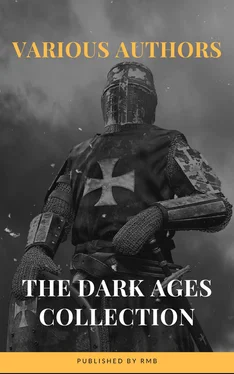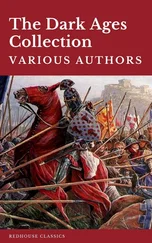Justin, terrified at this revelation, laid it before his father, who immediately consulted with Marcellus, the Count of the Excubitors, whether it would be wise to inform the Emperor immediately. Marcellus, an honourable, austere, and wary man, dissuaded Germanus from taking that course, on the ground that such a communication, necessitating a private interview with the Emperor, would inevitably become known to the conspirators and lead to the escape of Arsaces. He proposed to investigate the matter himself, and it was arranged that one of the conspirators should be lured to speak in the presence of a concealed witness. Justin appointed a day and hour for an interview between Germanus and Chanaranges, and the compromising revelations were overheard by Leontius, a friend of Marcellus, who was hidden behind a curtain. The programme of the matured plot was to wait for the arrival of Belisarius and slay the Emperor and his general at the same time; for if Justinian were slain beforehand, the conspirators might not be able to contend against the soldiers of Belisarius. When the deed was done, Germanus was to be proclaimed Emperor.
Marcellus still hesitated to reveal the plot to the Emperor, through friendship or pity for Artabanes. But when Belisarius was drawing nigh to the capital he could hesitate no longer, and Justinian ordered the conspirators to be arrested. Germanus and Justin were at first not exempted from suspicion, but when the Senate inquired into the case, the testimony of Marcellus and Leontius, and two other officers to whom Germanus had prudently disclosed the affair, completely cleared them. Even then Justinian was still indignant that they had concealed the treason so long, and was not mollified until the candid Marcellus took all the blame of the delay upon himself. The conspirators were treated with clemency, being confined in the Palace and not in the public prison. Artabanes was not only soon pardoned but was created Master of Soldiers in Thrace and sent to take part in the Ostrogothic war. 183
Another plot to assassinate Justinian was organised by a number of obscure persons in November A.D. 562, 184and would hardly merit to be recorded if it had not injured Belisarius. One of the conspirators talked indiscreetly to Eusebius, Count of the Federates, and they were all arrested. Their confessions involved two followers of Belisarius, who, seized and examined by the Prefect of the City and the quaestor, asserted that Belisarius was privy to the plot. The Emperor convoked a meeting of the Senate and Imperial Council; the depositions of the prisoner were read; and suspicion weighed heavily on the veteran general. He made no resistance when he was ordered to dismiss all his armed retainers, and he remained in disgrace till July A.D. 563, when he was restored to favour. 185His character and the whole record of his life make it highly improbable that he was guilty of disloyalty in his old age. He died in March A.D. 565. 186His disgrace, though it was brief, made such an impression on popular imagination in later times that a Belisarius legend was formed, which represented the conqueror of Africa and Italy as ending his days as a blind beggar in the streets of Constantinople. 187
§ 10. The Succession to the Throne
As Justinian had no children of his own, it was incumbent on him to avert the possibility of a struggle for the throne after his death by designating a successor. So long as Theodora was alive the importance of providing for the future was not so serious, as it might be reasonably supposed that she would be able to control the situation as successfully as Pulcheria and Ariadne. But after her death it was a dereliction of duty on the part of Justinian, as it had been on the part of Anastasius, not to arrange definitely the question of the succession. His failure to do so was probably due partly to his suspicious and jealous temper, and partly to an inability to decide between the two obvious choices.
Of his three cousins, Germanus, Boraides, and Justus, 188only Germanus survived Theodora, but he, who was an able man and whom the popular wish would have called to the throne, died two years later. His two sons, Justin and Justinian, were competent officers. We have seen them occupying important military posts, and if they were not trusted with the highest commands, it is probable that they did not display ability of the first rank. They were both unreservedly loyal to the sovran, and Justin seems, like his father, to have enjoyed general respect and popularity. 189If Justinian had decided to create him Caesar or Augustus, the act would have been universally applauded.
The influence of Theodora had rendered it impossible for the Emperor, in her lifetime, to show any special preference for this branch of his kin. Germanus, whose amiable qualities and sense of justice endeared him to others, was hated and suspected by her. She resolved that his family should not multiply. He had children, but he should have no grandchildren. In this design she so far succeeded that neither of his sons married till after her death. All her efforts, however, did not prevent his daughter Justina from espousing the general John, nephew of Vitalian, but she threatened that she would destroy John and he went in fear of his life. 190
Justinian had nephews, sons of his sister Vigilantia, 191and on the eldest of these, Justin, the Empress bestowed her favour. Her desire was that her own blood should be perpetuated in the dynasty, and she married her niece Sophia, a woman who possessed qualities resembling her own, to Justin. After her death, Justinian seems to have been convinced that the conspicuous merits of Germanus entitled him to the succession, but he was unable to bring himself to take a definite decision. When Germanus died the choice lay between the two Justins, the nephew and the cousin, and we may divine that there was a constant conflict between their interests at court. The Emperor’s preference inclined, on the whole, to Justin, the husband of Sophia. He created him Curopalates, a new title of rank which raised him above the other Patricians, yet did not give him the status of an heir apparent which would have been conferred by the title of Caesar or even Nobilissimus. 192But Justin enjoyed the great advantage of living in the Palace and having every opportunity to prepare his way to the throne; while the services of his rival and namesake were employed in distant Colchis.
Not the least of Theodora’s triumphs was the posthumous realisation of her plan for the succession. Justinian died on Nov. 14, A.D. 565, 193and Justin, the son of Vigilantia, supported by the Senate and the Excubitors, secured the throne without a struggle.
APPENDIX:
A SCENE IN THE HIPPODROME
The chronicle of Theophanes contains a remarkable record of a conversation between Justinian and the Green party in the Hippodrome. It is apparently an official record (preserved in the archives of the Greens?), under the title Ἄκτα διὰ Καλοπόδιον τὸν κουβικουλάριον καὶ σπαθάριον, and is inserted after the short summary of the Nika riot which the chronicler has prefixed to his detailed narrative. But it exhibits no connexion whatever with the causes of that event, and may record an incident which occurred at some other period of the reign. 194It seems likely that Calopodius who had offended the Greens is the same as Calopodius who was praepositus s. cub. in A.D. 558 (John Mal. XVIII p490).
As we are totally ignorant of the circumstances, a great part of this allusive dialogue is very obscure. Some act on the part of the chamberlain Calopodius had excited the anger of the Greens; they begin by complaining of this in respectful tones, and obtaining no satisfaction go on to air their grievances as an oppressed party, with violent invective. A mandator or herald speaks for the Emperor, standing in front of the kathisma, and the Greeks evidently have a single spokesman.
Читать дальше












